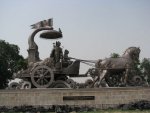Lanefan
Victoria Rules
If that were only possible...You're now talking about potentially starting in on a fight, realizing it is boring, and switching mechanics mid-stream?
Problem is, often you don't know how interesting any given battle is going to be or how long it'll drag out for until you're already three or four rounds in...by which point you're committed.Eew. That's ugly. In terms of player expectations, I mean. I'd rather just truncate the fight, give the PCs the benefit of the doubt, and move on to the next thing.
I agree it's ugly, but truncating the fight isn't an option if you don't know who's going to win...
Worst example in my current campaign: party come out of a hallway into a room full of Orcs and back up. Party's two front-liners back away 5' down the hall to limit the number of enemy that can get at them; the Orcs charge, and battle begins. Party back-liners use up their spells (accomplishing little), Orc back-liners use up their ammunition (accomplishing less); meanwhile the front-liners on both sides are rolling garbage and just can not hit each other! The back-line Orcs were eventually reduced to throwing furniture at the back-line PCs, who happily threw it back...
This went on for about 25-30 rounds, during which time any lucky hit or critical turns the tide in favour of the side that gets it; but none do. Meanwhile, other than the laughter caused by the gross ineptitude of both sides, we're all getting bored out of our minds.
I can't call it off and say the PCs win, as at this point there's nothing saying that they will...but some sort of quick-resolution mechanic would have saved us hours! (I can't remember whether the Orcs had anywhere they could have run to, as a way of ending that particular fight; but they were supposed to be half-drunk anyway so "run" would not be in their vocabulary)
Finally, the PCs get an opening when the Orc front line collapses and from there it was just a matter of a few quick rounds worth of mopping up. The entire battle went for 32 rounds.
Lan-"the worst enemy of fast combat is good armour"-efan



